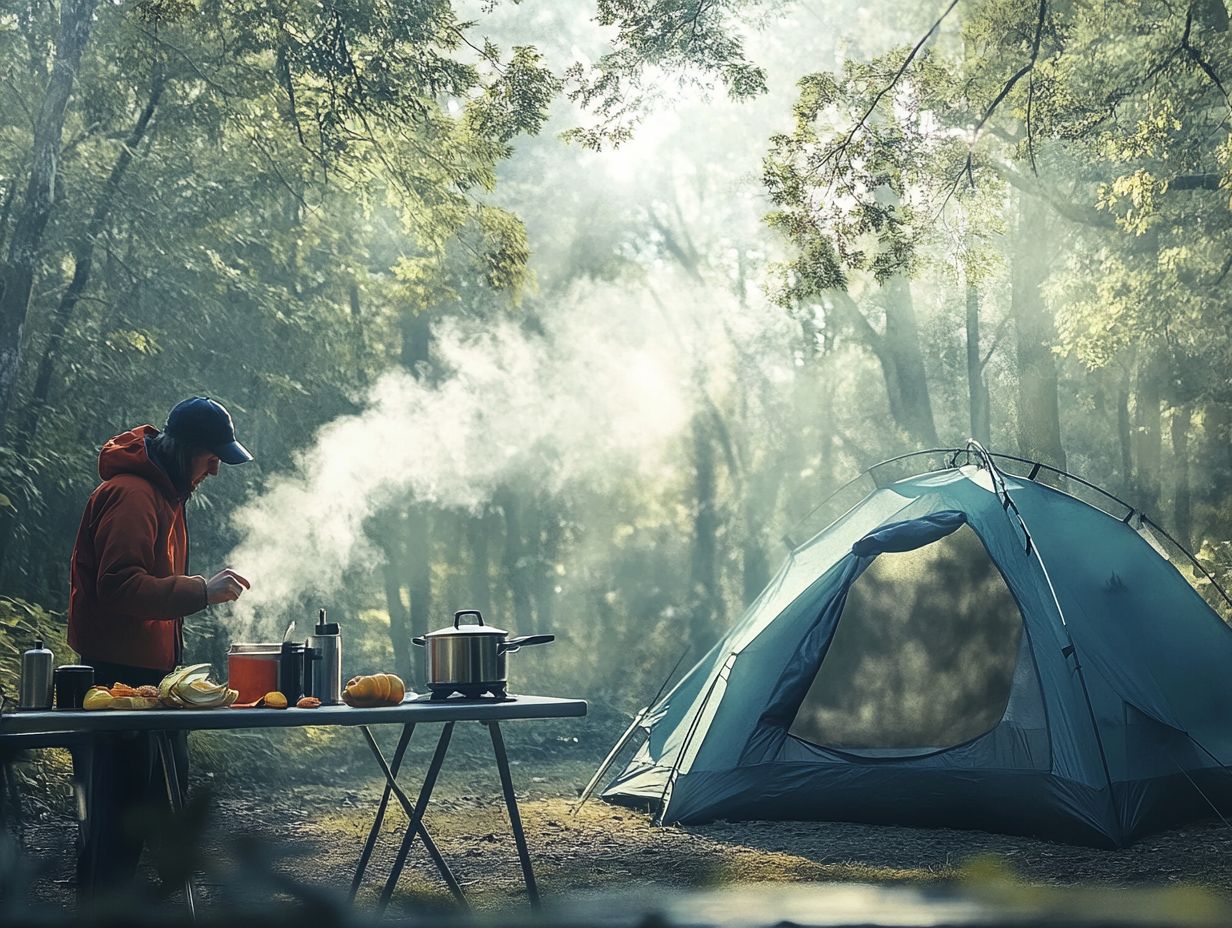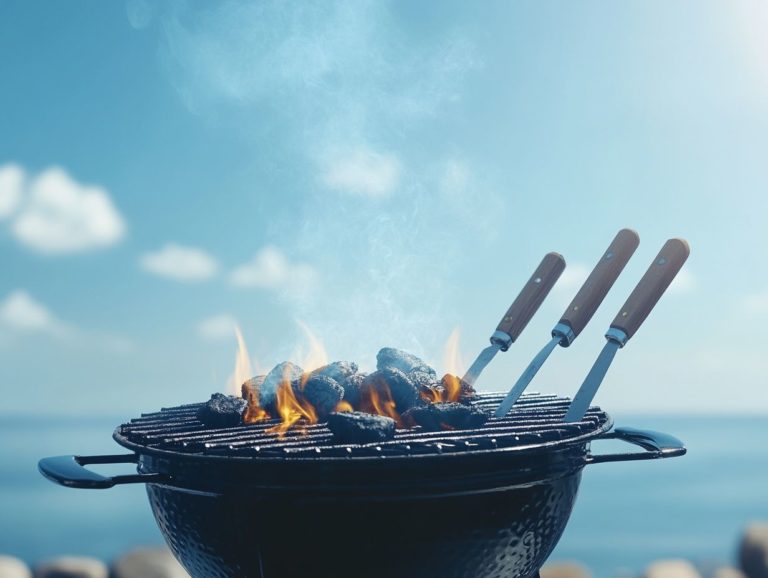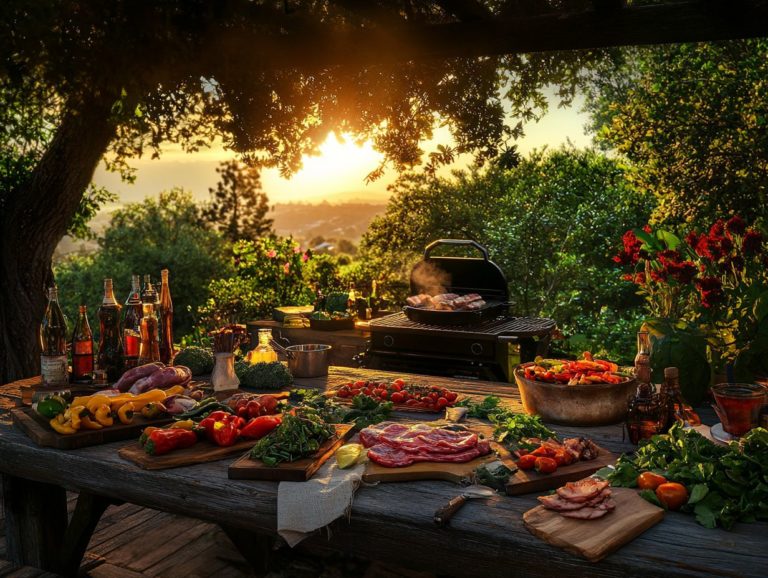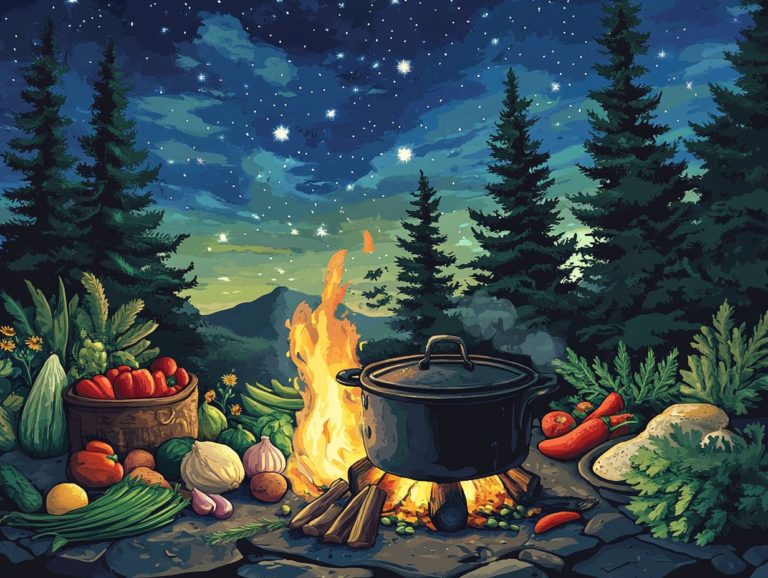Can I Cook in a Tent?
Cooking while camping can transform your outdoor experience into something truly delightful. However, cooking in a tent presents its own unique challenges and rewards, especially when considering the various tent types available.
Whether you crave the comforting embrace of a home-cooked meal after a long day of exploration or wish to savor the great outdoors, mastering safe and efficient cooking in a tent is essential.
This guide will equip you with vital information on essential equipment, safety tips, and creative meal ideas. You ll be ready for enjoyable and safe outdoor culinary adventures, whether in Kohte or Mount Rainier.
Contents
Key Takeaways:
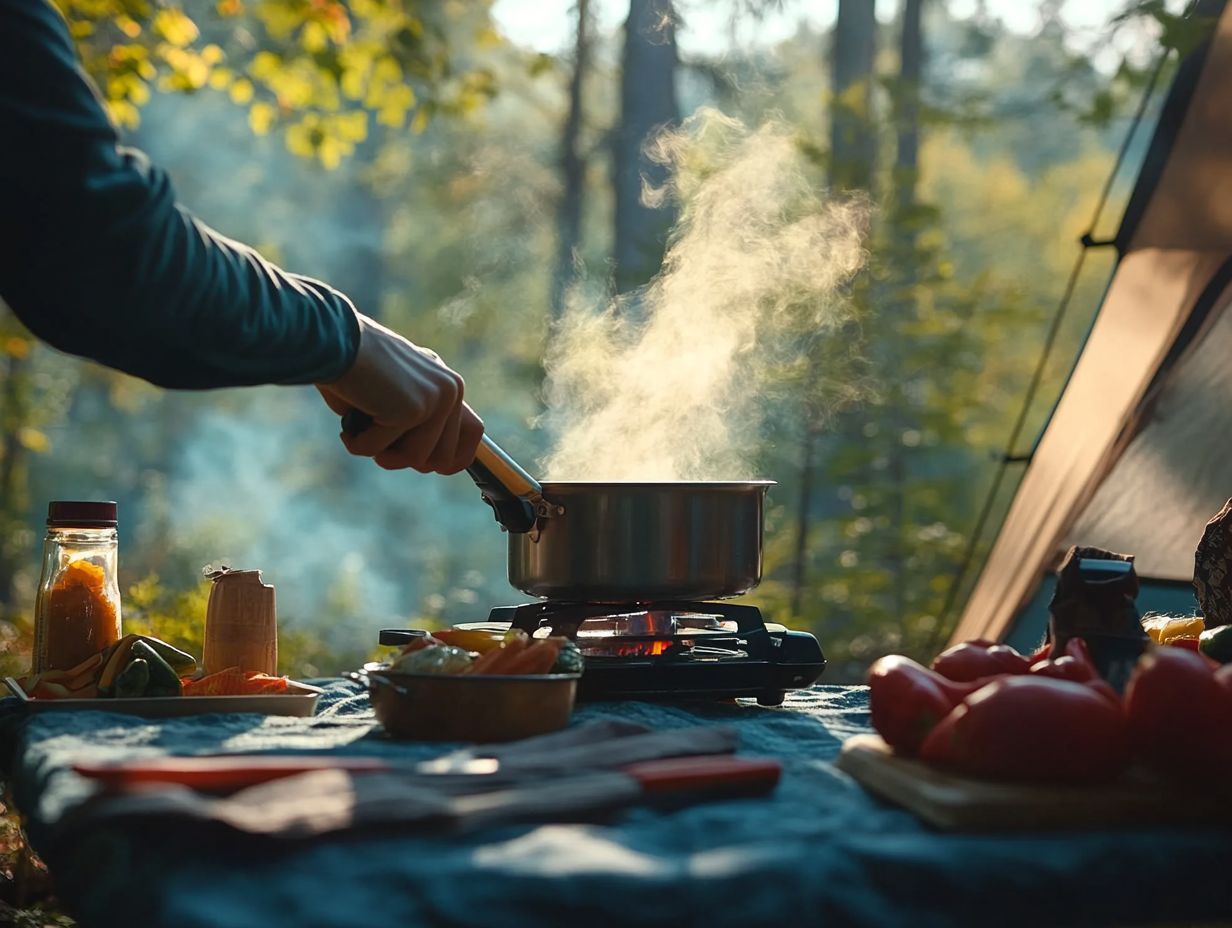
- Cooking in a tent can add a fun and unique element to camping trips, especially for those who embrace unpredictable weather conditions.
- Take proper safety precautions, including fire safety and food safety, to ensure a successful and enjoyable cooking experience.
- With proper planning, you can prepare simple and easy meals in a tent.
The Basics of Cooking in a Tent
Cooking in a tent makes camping even better! It allows you to savor delicious meals while immersed in the splendor of nature. Understanding the basics of tent cooking is crucial for a successful outdoor adventure.
With the right preparation and equipment, including a reliable gas cooker or propane stove, you can create a cozy culinary haven in your tent. This setup reflects your personal tastes, even in challenging weather. It’s essential to evaluate the types of tents and stove options available to ensure effective cooking without jeopardizing safety particularly in areas where hazards like carbon monoxide poisoning can arise when stoves are used in enclosed spaces without ventilation.
Why Cook in a Tent?
Cooking in a tent elevates your camping experience, allowing you to whip up warm meals and enjoy a sense of comfort amidst the great outdoors.
It provides a dedicated space for meal preparation, keeping everything organized and within easy reach. This spares you the frustrations of cooking outside in unpredictable weather. You and your companions can indulge in delicious, hot dishes that create a delightful contrast to the cooler elements surrounding you.
The tent sets the stage for an inviting atmosphere where friends and family can gather. Collaborating in the kitchen fosters a sense of togetherness and promotes teamwork, forging lasting memories and transforming your outdoor adventure into a truly enriching experience.
Essential Equipment and Supplies
Equipping yourself with the right supplies is crucial when cooking in a tent. The wrong gear can lead to safety issues and compromised meals.
Choosing the right stove is a fundamental part of your preparation. Gas cookers are often your best friend due to their convenience and speed. They allow you to whip up meals in no time. On the flip side, propane stoves, while potentially bulkier, provide robust heating capabilities, making them ideal for more extensive cooking endeavors. For the adventurous spirits, white gas stoves excel in cold weather, proving to be stellar choices for those willing to brave the elements.
Remember to keep safety measures in mind:
- Use stoves in well-ventilated areas to minimize the risk of carbon monoxide buildup.
- Keep flammable materials far from heat sources.
- Ensure proper connection and setup to prevent leaks.
Understanding these cooking supplies will significantly enhance your outdoor cooking experience, turning each meal into an adventure.
Safety Considerations
When cooking in a tent, grasping the safety considerations is essential for preventing accidents and ensuring a seamless outdoor cooking experience. The charm of cooking outdoors can quickly turn hazardous without proper safety measures.
From the risk of carbon monoxide poisoning with a gas cooker to the potential for fire hazards, prioritizing safety is crucial. Ensure adequate ventilation and remain vigilant in your cooking area.
By adhering to established cooking safety guidelines, you can savor outdoor meals while sidestepping unnecessary risks.
Fire Safety Precautions
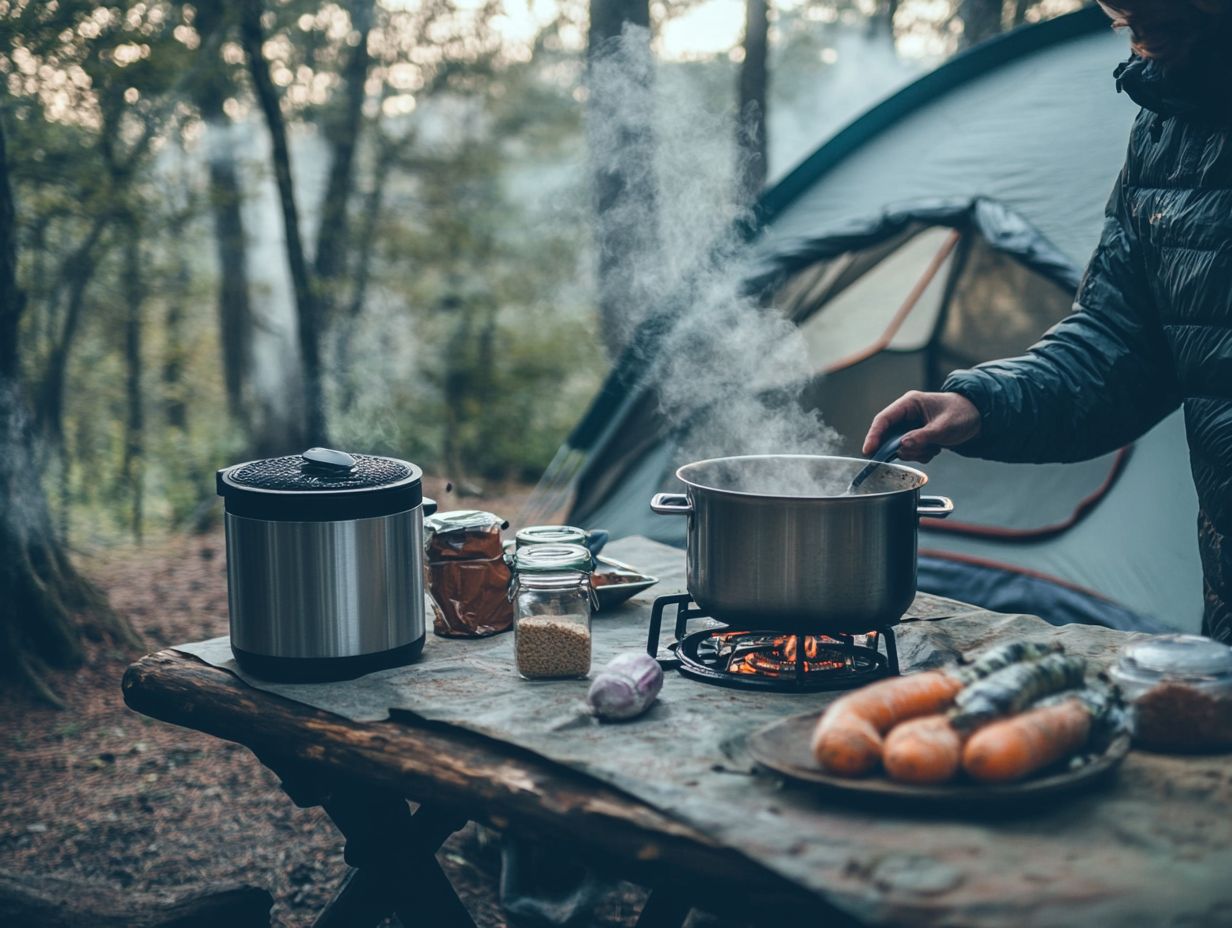
Fire safety is vital to avoid accidents and enjoy your adventure! When cooking in a tent, it s crucial to take precautions.
Selecting flame-resistant materials for your tent and gear is essential. Maintain a healthy distance from the tent vestibule while cooking, as this area can quickly become risky if sparks fly.
Keep your cooking space well-organized. Ensure it s free from flammable items like propane canisters or dry leaves. By adopting these fire safety measures, you can significantly reduce risks and pave the way for a more enjoyable outdoor experience.
Food Safety Tips
Food safety is paramount while camping, particularly in bear country. Prevent attracting unwanted wildlife and create a safe cooking environment.
By following key practices, you can significantly reduce risks. Proper food storage is crucial; use bear-proof containers and keep your food at least 200 feet away from sleeping areas to minimize odors that lure wildlife.
Maintaining personal hygiene is just as important! Wash your hands before handling food and after using the restroom to prevent the spread of harmful bacteria.
Understand the importance of cooking food to safe temperatures typically 165 F for poultry and 160 F for ground meats. This ensures you and your companions have a healthy and safe camping experience.
Meal Ideas for Cooking in a Tent
Cooking in a tent opens up a world of culinary possibilities! Savor delightful meals that are both uncomplicated and fulfilling ideal for the art of outdoor cooking.
Simple and Delicious Recipes
Simple and delicious recipes can elevate your tent cooking experience! Transform meal prep into an enjoyable and hassle-free endeavor.
When you re outdoors, easy-to-follow recipes can enhance your camping adventure. Consider hearty one-pot meals that require minimal cleanup or delightful foil pack dishes cooked over an open campfire.
Ingredients like canned beans, rice, and seasonal vegetables provide nourishment and flavor. With just a portable stove or grill, you can streamline your preparation.
With a sprinkle of creativity and some outdoor cooking techniques, you can easily whip up satisfying meals that nourish both your body and spirit under the twinkling stars.
Tips for Successful Tent Cooking
To achieve successful tent cooking, embrace well-organized planning. This approach enhances your culinary experience while camping and reduces stress.
Planning Ahead and Staying Organized
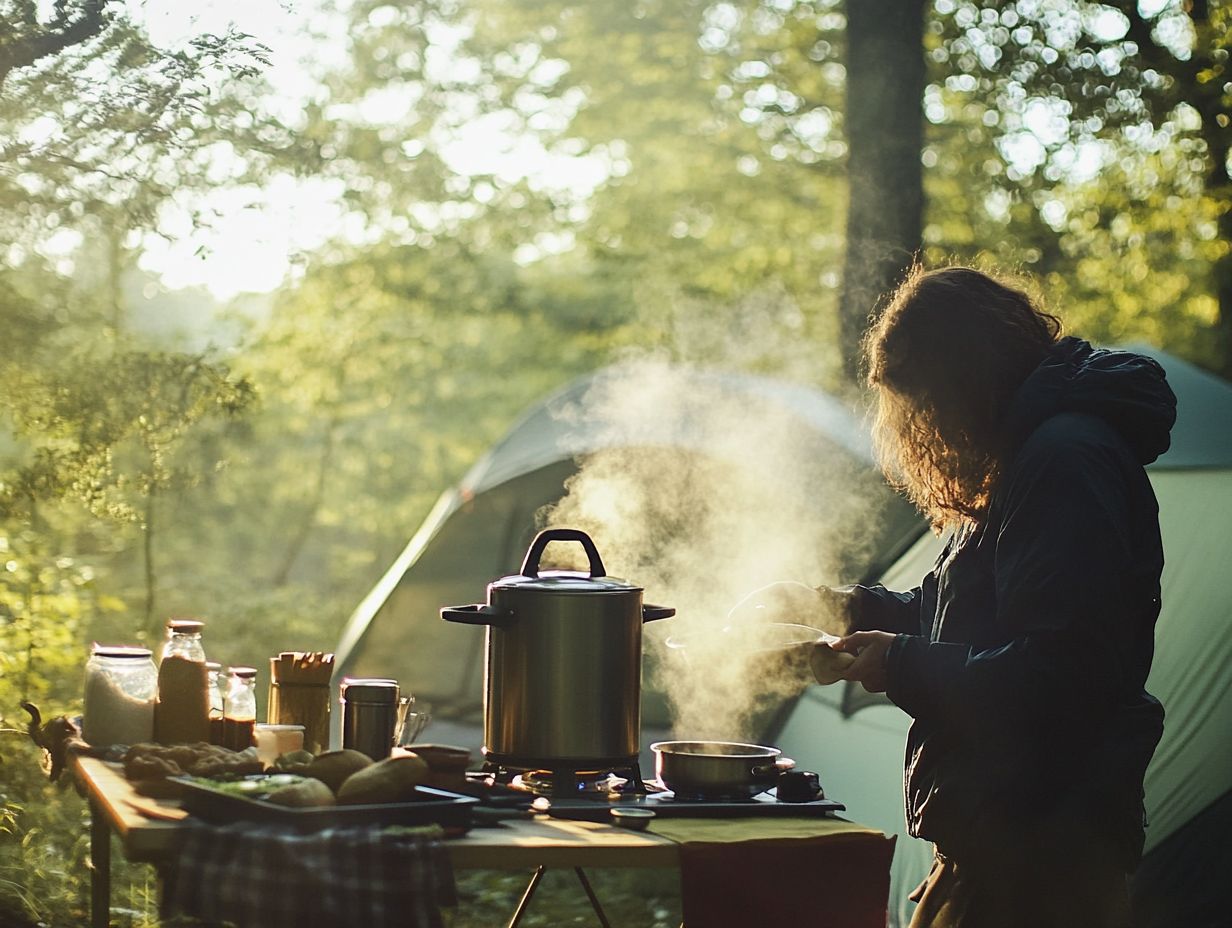
Planning ahead and staying organized are essential for a successful cooking experience while camping in a tent.
Create a detailed meal list that outlines each dish you’ll prepare during your trip. This helps streamline grocery shopping and avoid overpacking.
Packing the right essentials like portable cooking gear, utensils, and storage containers will make both cooking and cleanup a breeze.
Prepping ingredients in advance, such as chopping vegetables or marinating proteins, can save you time and effort once you arrive at the campsite.
A well-organized cooler, thoughtfully separated for different food groups, will help maintain freshness and accessibility throughout your camping adventure.
Alternatives to Cooking in a Tent
Exploring alternatives to cooking in a tent can elevate your outdoor experience! Embrace different cooking methods to expand your palate and add a layer of creativity to your time in nature.
Other Outdoor Cooking Options
You have a wealth of outdoor cooking options that can beautifully complement or even replace tent cooking, offering you both flexibility and variety.
Among these methods, campfire cooking truly shines, inviting you to gather around the flames for a rustic experience think roasting marshmallows or grilling fresh vegetables under the stars. If convenience is what you seek, portable stoves are your go-to, allowing you to whip up tasty meals with minimal fuss, even in the most remote locations.
On warm days, consider embracing no-cook techniques, which can be a delightful option. Enjoy fresh salads or sandwiches that require nothing more than top-notch ingredients.
Whichever method you choose, remember that safety is paramount. Don’t take risks! Always maintain a safe distance from flammable materials and adhere to local regulations regarding open flames.
Frequently Asked Questions
Can I Cook in a Tent?
Yes, you can cook in a tent, but there are a few important things to keep in mind.
What Types of Cooking Methods Can I Use in a Tent?
You can use a small portable stove, a camping grill, or even a campfire with a heavy pot that cooks food evenly to prepare meals in a tent. If you’re considering alternatives, you might wonder, can I cook with a portable gas grill?
Is It Safe to Cook in a Tent?
Cooking in a tent can be safe if proper precautions are taken. Make sure there is adequate ventilation and keep flammable materials away from the heat source. If you’re wondering about using devices like the Instant Pot for your outdoor cooking needs, check out this article on cooking with Instant Pot outdoors.
What Should I Consider Before Cooking in a Tent?
Consider the size of your tent, the type of food you plan to cook, and the weather conditions. It’s also important to have a designated cooking area and keep the tent well-ventilated.
Can I Use a Regular Stove or Grill in a Tent?
No, it is not recommended to use a regular stove or grill in a tent as they produce large amounts of heat and can create a fire hazard. Stick to small, portable cooking equipment designed for outdoor use.
How Do I Clean Up After Cooking in a Tent?
Make sure to properly dispose of any food waste and clean up any spills or debris. It’s also important to properly store any cooking equipment to avoid attracting animals or bugs.
Stay safe and enjoy your cooking adventure!

